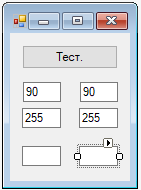Здраствуйте, помогите решить вроде простую задачу.
У меня микроконтроллер Iskra Neo.
Необходимо из textBox передать информацию по SerialPort в Arduino. Всего 4 переменные.
Я глупый или как но у меня это не получается.
Лучше предложите свой код.
Мой код.
Нерабочий.
Библиотеки.
using System.Threading;
using System.IO.Ports;
Код.
SerialPort port;
int timeout = 100;
port = new SerialPort("COM7", 9600);
port.Open();
port.ReadTimeout = timeout;
textBox3.Text = "Начало";
port.WriteLine(textBox1.Text);
while (port.BytesToRead <= 0) { Thread.Sleep(1000); }
port.WriteLine(textBox2.Text);
while (port.BytesToRead <= 0) { Thread.Sleep(1000); }
port.WriteLine(textBox6.Text);
while (port.BytesToRead <= 0) { Thread.Sleep(1000); }
port.WriteLine(textBox5.Text);
while (port.BytesToRead <= 0) { Thread.Sleep(1000); }
textBox3.Text = "Конец";
Thread.Sleep(1000);
textBox3.Text = "Заново";

Arduino.
void setup() {
Serial.begin(9600);
Serial.setTimeout(100);
}
void loop() {
int arr[4];
int i = 0;
while (i < 4) {
if (Serial.available()) {
arr[i] = Serial.parseInt();
Serial.println("ещё");
i++;
}
}
turn(arr[0], arr[1], 1, 2, 3, 4, 18);
turn(arr[2], arr[3], 6, 7, 8, 9, 18);
}
Функция.
void turn(int a, int velocity, byte shim, byte in1, byte in2, int encoderIn, int holes)
{
int detectState = 0;
bool freq;
int longer = 0;
pinMode(encoderIn, INPUT);
detectState = digitalRead(encoderIn);
freq = detectState;
bool executed = true;
int tics = (abs(a) * 2) / (360 / holes);
pinMode( shim, OUTPUT );
pinMode( in1, OUTPUT );
pinMode( in2, OUTPUT );
analogWrite( shim, velocity );
if (a < 0) {
digitalWrite( in1, HIGH );
digitalWrite( in2, LOW );
} else {
digitalWrite( in1, LOW );
digitalWrite( in2, HIGH );
}
while (executed) {
detectState = digitalRead(encoderIn);
if (detectState != freq) {
longer++;
freq = detectState;
}
if (longer > tics) {
digitalWrite( in1, LOW );
digitalWrite( in2, LOW );
executed = false;
}
}
}
Однако если у кого-то может сложится мнение, что не работает turn то вы ошибаетесь.
Вот как пример рабочего кода.
void setup() {
Serial.begin(9600);
Serial.setTimeout(100);
}
void loop() {
while (true) {
if (Serial.available()) {
turn(Serial.parseInt(), 255, 1, 2, 3, 4, 18);
goto d;
}
}
d:{}
}
turn из предыдущего кода.
SerialPort port;
int timeout = 100;
port = new SerialPort("COM7", 9600);
port.Open();
port.ReadTimeout = timeout;
port.WriteLine(textBox1.Text);
Заранее благодарю.

